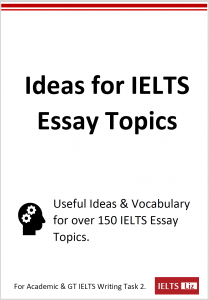Hi guys,
I want to check how much you understand about Overviews in IELTS writing task 1 for the academic paper. There are six kinds of writing task 1:
- bar charts
- pie charts
- line graphs
- tables
- maps
- diagrams (processes)
Questions to You
- Do you think all types of writing task 1 above require an Overview?
- Do you think the Overview is very important?
Answers
The answers are now available.
Click below to see the answers, get tips and free video lessons:
Answers about Overview in IELTS Writing Task 1
All the best
Liz







